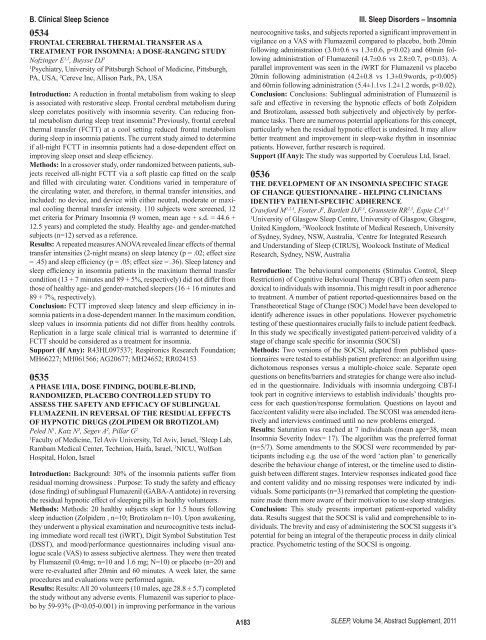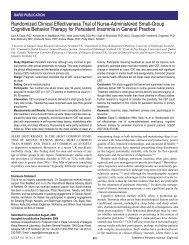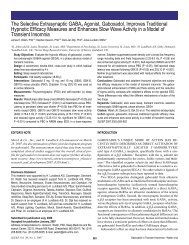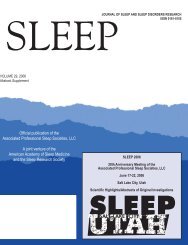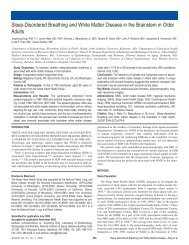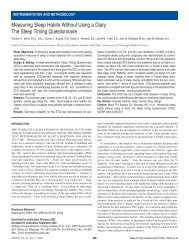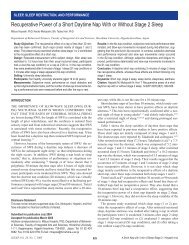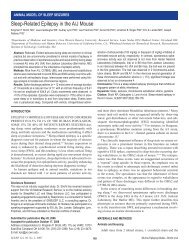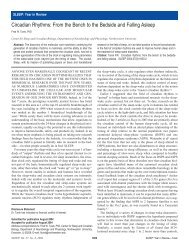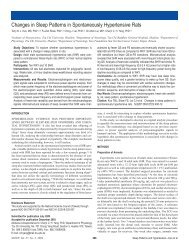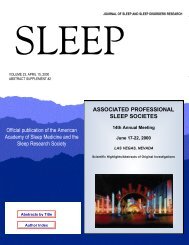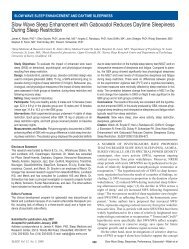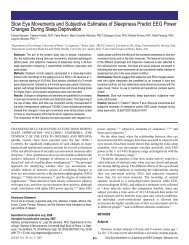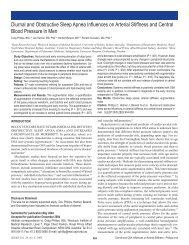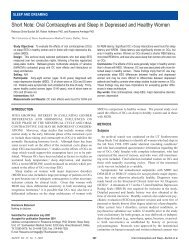SLEEP 2011 Abstract Supplement
SLEEP 2011 Abstract Supplement
SLEEP 2011 Abstract Supplement
Create successful ePaper yourself
Turn your PDF publications into a flip-book with our unique Google optimized e-Paper software.
B. Clinical Sleep Science III. Sleep Disorders – Insomnia<br />
0534<br />
FRONTAL CEREBRAL THERMAL TRANSFER AS A<br />
TREATMENT FOR INSOMNIA: A DOSE-RANGING STUDY<br />
Nofzinger E 1,2 , Buysse DJ 1<br />
1<br />
Psychiatry, University of Pittsburgh School of Medicine, Pittsburgh,<br />
PA, USA, 2 Cereve Inc, Allison Park, PA, USA<br />
Introduction: A reduction in frontal metabolism from waking to sleep<br />
is associated with restorative sleep. Frontal cerebral metabolism during<br />
sleep correlates positively with insomnia severity. Can reducing frontal<br />
metabolism during sleep treat insomnia? Previously, frontal cerebral<br />
thermal transfer (FCTT) at a cool setting reduced frontal metabolism<br />
during sleep in insomnia patients. The current study aimed to determine<br />
if all-night FCTT in insomnia patients had a dose-dependent effect on<br />
improving sleep onset and sleep efficiency.<br />
Methods: In a crossover study, order randomized between patients, subjects<br />
received all-night FCTT via a soft plastic cap fitted on the scalp<br />
and filled with circulating water. Conditions varied in temperature of<br />
the circulating water, and therefore, in thermal transfer intensities, and<br />
included: no device, and device with either neutral, moderate or maximal<br />
cooling thermal transfer intensity. 110 subjects were screened, 12<br />
met criteria for Primary Insomnia (9 women, mean age + s.d. = 44.6 +<br />
12.5 years) and completed the study. Healthy age- and gender-matched<br />
subjects (n=12) served as a reference.<br />
Results: A repeated measures ANOVA revealed linear effects of thermal<br />
transfer intensities (2-night means) on sleep latency (p = .02; effect size<br />
= .45) and sleep efficiency (p = .05; effect size = .36). Sleep latency and<br />
sleep efficiency in insomnia patients in the maximum thermal transfer<br />
condition (13 + 7 minutes and 89 + 5%, respectively) did not differ from<br />
those of healthy age- and gender-matched sleepers (16 + 16 minutes and<br />
89 + 7%, respectively).<br />
Conclusion: FCTT improved sleep latency and sleep efficiency in insomnia<br />
patients in a dose-dependent manner. In the maximum condition,<br />
sleep values in insomnia patients did not differ from healthy controls.<br />
Replication in a large scale clinical trial is warranted to determine if<br />
FCTT should be considered as a treatment for insomnia.<br />
Support (If Any): R43HL097537; Respironics Research Foundation;<br />
MH66227; MH061566; AG20677; MH24652; RR024153<br />
0535<br />
A PHASE I/IIA, DOSE FINDING, DOUBLE-BLIND,<br />
RANDOMIZED, PLACEBO CONTROLLED STUDY TO<br />
ASSESS THE SAFETY AND EFFICACY OF SUBLINGUAL<br />
FLUMAZENIL IN REVERSAL OF THE RESIDUAL EFFECTS<br />
OF HYPNOTIC DRUGS (ZOLPIDEM OR BROTIZOLAM)<br />
Peled N 1 , Katz N 3 , Segev A 2 , Pillar G 2<br />
1<br />
Faculty of Medicine, Tel Aviv University, Tel Aviv, Israel, 2 Sleep Lab,<br />
Rambam Medical Center, Technion, Haifa, Israel, 3 NICU, Wolfson<br />
Hospital, Holon, Israel<br />
Introduction: Background: 30% of the insomnia patients suffer from<br />
residual morning drowsiness . Purpose: To study the safety and efficacy<br />
(dose finding) of sublingual Flumazenil (GABA-A antidote) in reversing<br />
the residual hypnotic effect of sleeping pills in healthy volunteers.<br />
Methods: Methods: 20 healthy subjects slept for 1.5 hours following<br />
sleep induction (Zolpidem , n=10; Brotizolam n=10). Upon awakening,<br />
they underwent a physical examination and neurocognitive tests including<br />
immediate word recall test (iWRT), Digit Symbol Substitution Test<br />
(DSST), and mood/performance questionnaires including visual analogue<br />
scale (VAS) to assess subjective alertness. They were then treated<br />
by Flumazenil (0.4mg; n=10 and 1.6 mg; N=10) or placebo (n=20) and<br />
were re-evaluated after 20min and 60 minutes. A week later, the same<br />
procedures and evaluations were performed again.<br />
Results: Results: All 20 volunteers (10 males, age 28.8 ± 5.7) completed<br />
the study without any adverse events. Flumazenil was superior to placebo<br />
by 59-93% (P


